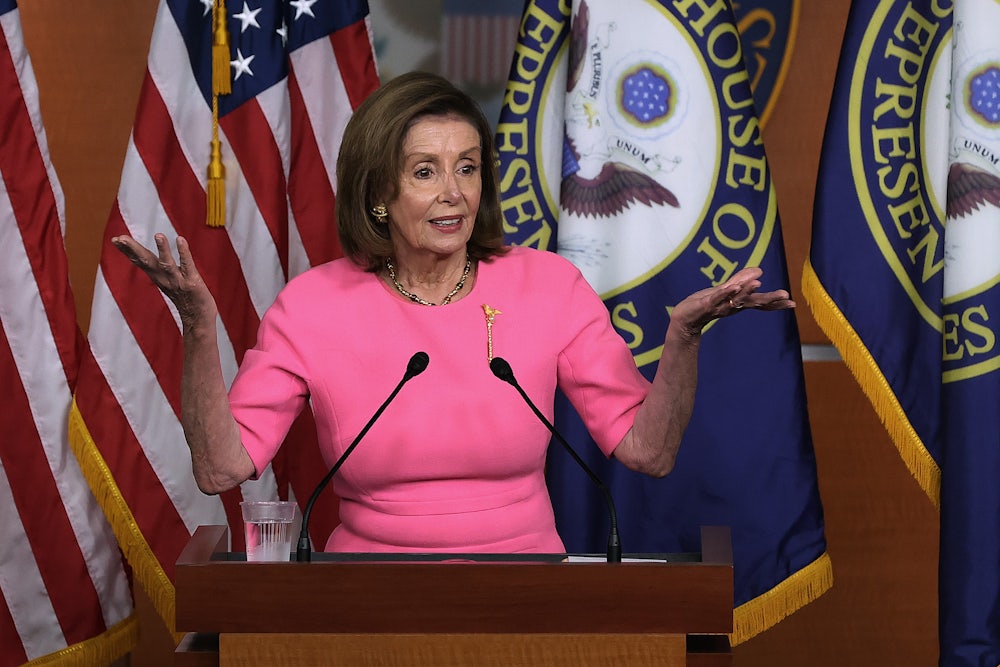The budget reconciliation bill has reached a “potentially devastating impasse” (The New York Times), and “the fate of the Biden presidency” is “on the line” (Greg Sargent, The Washington Post). These are the times that try men’s souls. Except not mine, particularly. All I see is a power struggle between the Democrats’ left and right flanks that will get resolved, probably quite satisfactorily, fairly soon.
It’s amazing to me that a political class that so recently experienced a genuine political crisis—the January 6 Capitol insurrection—can get so worked up over a crisis that’s so obviously phony. The Democrats’ progressive wing and its moderate wing are haggling over the size of what will certainly be a very large spending bill by any historic reckoning. The moderates have more clout than they should because the Democrats’ Senate majority is paper-thin. Senators Kyrsten Sinema and Joe Manchin are exploiting the situation for all it’s worth, and that’s certainly annoying. But it isn’t an emergency.
Democratic leaders in Congress have proposed a $3.5 trillion budget funded by $2.9 trillion in taxes. (Both figures represent spending and revenues projected over 10 years.) Senate moderates say that’s too much. Manchin published an op-ed earlier this month in The Wall Street Journal complaining that the bill will create “inflation and debt.” Presumably it will do neither if the $3.5 trillion in spending is lowered to match the $2.9 trillion in taxes. But Manchin isn’t proposing that, and neither is Sinema. They aren’t saying what they’ll settle for because they want to keep their options open. The progressives aren’t saying what they’re willing to give up for the same reason.
Both sides are making threats. Manchin and Sinema, along with a smattering of House moderates, are saying they won’t vote for the reconciliation bill unless it’s scaled back. House progressives say they won’t support the Senate-passed $1 trillion infrastructure bill, which has bipartisan support, if they don’t first get a vote on the reconciliation bill. Since neither side has any interest in blowing up Biden’s agenda, they will strike some sort of compromise. Achieving such compromises is something that President Joe Biden and Senate Majority Leader Chuck Schumer are very good at and that House Speaker Nancy Pelosi is better at than any American politician alive.
What’s frustrating, especially for progressives, is how vague this disagreement is. Manchin has voiced opposition to certain provisions in the budget package concerning climate change, and Sinema has waved around some spreadsheets of dubious salience, but the true basis of their opposition appears to be that they don’t want to seem too liberal.
Manchin as much as said this in his op-ed when he complained that the reconciliation bill was intended not “to solve urgent problems, but to re-envision America’s social policies.” Well, yes. Manchin wants to be seen as someone who’s reluctant to re-envision anything. So does Sinema. The imprecision of their opposition isn’t especially rational. It’s a matter of political positioning to please constituencies that aren’t especially liberal. For Democrats, the downside to winning Senate races in states where Trump either won (West Virginia) or nearly won (Arizona) is that you end up with senators who aren’t as liberal as their peers.
The same is true of the House’s so-called Trump Democrats. A wild card in the negotiations is the New Democrat Coalition, which claims 95 members—the same number as the House Progressive Caucus. These moderate House Democrats are pursuing a more diffuse agenda than the progressive House Democrats, so they pose less of a problem. But some of them succeeded in knocking out Biden’s proposed elimination of the “angel of death” capital gains loophole from the House bill, and three of them kept the Energy and Commerce Committee from approving Biden’s plan to allow Medicare to negotiate drug prices with pharmaceutical companies. The latter opposition can’t sensibly be called moderate, or even conservative; it’s just crudely, blindly pro-Pharma.
A mistake people often make when thinking about Congress is that it’s a place where deliberation takes place. It doesn’t, not even in the Senate, which President James Buchanan is said to have called “the world’s greatest deliberative body.” (As usual with famous quotations, the attribution is difficult to pin down.) Members of Congress don’t persuade one another; they seldom even listen to one another. What they do is count votes and make deals. That’s what the House and Senate will do about the reconciliation bill. When that happens, the same journalists who right now claim Biden’s presidency is in dire peril will pronounce the grand compromise a miracle. That won’t be true, either.










